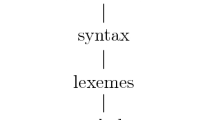Abstract
Although undeniably useful for the translation of certain types of repetitive document, current translation memory technology is limited by the rudimentary techniques employed for approximate matching. Such systems, moreover, incorporate no real notion of a document, since the databases that underlie them are essentially composed of isolated sentence strings. As a result, current TM products can only exploit a small portion of the knowledge residing in translators’ past production. This paper examines some of the changes that will have to be implemented if the technology is to be made more widely applicable.
Preview
Unable to display preview. Download preview PDF.
Similar content being viewed by others
References
Bédard, C.: Les mémoires de traduction: une tendance lourde. Circuit. 60. (1998) 25–26
Coates-Stephens, S.: The Analysis and Acquisition of Proper Names for Robust Text Understanding. PhD thesis, City University, London. (1992)
EAGLES Evaluation of Natural Language Processing Systems, Final Report. EAGLES document EAG-EWG-PR.2 (1995). Section E.3.1: Design and Function of Translation Memory, 140–145. Also available at http://issco-www.unige.ch/ewg95/
Falcone, S.: Translation Aid Software: Four Translation Memory Programs Reviewed. Translation Journal 2(1) (1998) http://accurapid.com/journal/03TM2.htm
Frakes, W.B.: Stemming Algorithms. In Frakes, W.B. and R. Baeza-Yates (eds.) Information Retrieval: Data Structures and Algorithms. Prentice Hall (1992) 131–160
Isabelle, P., Dymetman, M., Foster, G., Jutras, J-M., Macklovitch, E., Perrault, F., Ren, X., Simard, M.: Translation Analysis and Translation Automation. Proc. TMI’93. (1993) 201–217
Kaplan, R.M., Kay, M.: Regular Models of Phonological Rule Systems. Computational Linguistics 20(3) (1994) 331–378
Macklovitch, E., Simard, M., Langlais, P.: TransSearch: A Free Translation Memory on the World Wide Web. Proc. LREC 2000 III. (2000) 1201–1208
Planas, E., Furuse, O.: Formalizing Translation Memories. Proc. MT Summit VII. (1999) 331–339
Ramshaw, L.A., Marcus, M.P.: Text Chunking using Transformation-Based Learning. Proc. Workshop on Very Large Corpora. (1995) 82–94
Skut, W., Brants, T.: A Maximum-Entropy Partial Parser for Unrestricted Text. Proc. Sixth Workshop on Very Large Corpora. (1998) 143–151
Theologitis, D.: Translation Technology from Theory to Practice. Presentation at NLP2000, Patras. (2000)
Witten, I.H., Moffat, A., Bell, T.C.: Managing Gigabytes: Compressing and Indexing Documents and Images. Morgan Kaufmann (1999)
Author information
Authors and Affiliations
Editor information
Editors and Affiliations
Rights and permissions
Copyright information
© 2000 Springer-Verlag Berlin Heidelberg
About this paper
Cite this paper
Macklovitch, E., Russell, G. (2000). What’s Been Forgotten in Translation Memory. In: White, J.S. (eds) Envisioning Machine Translation in the Information Future. AMTA 2000. Lecture Notes in Computer Science(), vol 1934. Springer, Berlin, Heidelberg. https://doi.org/10.1007/3-540-39965-8_14
Download citation
DOI: https://doi.org/10.1007/3-540-39965-8_14
Published:
Publisher Name: Springer, Berlin, Heidelberg
Print ISBN: 978-3-540-41117-8
Online ISBN: 978-3-540-39965-0
eBook Packages: Springer Book Archive




